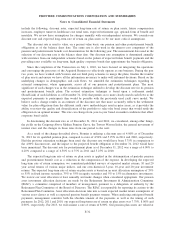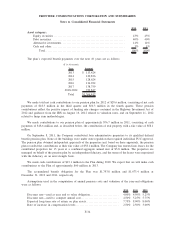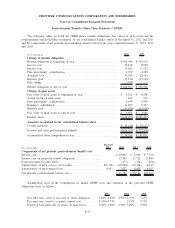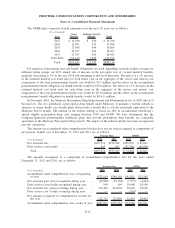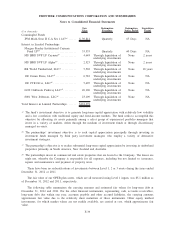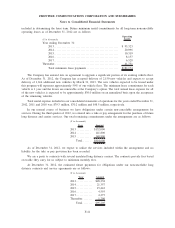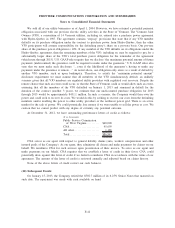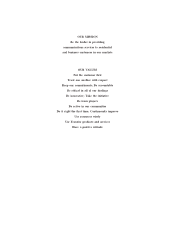Frontier Communications 2012 Annual Report Download - page 103
Download and view the complete annual report
Please find page 103 of the 2012 Frontier Communications annual report below. You can navigate through the pages in the report by either clicking on the pages listed below, or by using the keyword search tool below to find specific information within the annual report.
We sold all of our utility businesses as of April 1, 2004. However, we have retained a potential payment
obligation associated with our previous electric utility activities in the State of Vermont. The Vermont Joint
Owners (VJO), a consortium of 14 Vermont utilities, including us, entered into a purchase power agreement
with Hydro-Quebec in 1987. The agreement contains “step-up” provisions that state that if any VJO member
defaults on its purchase obligation under the contract to purchase power from Hydro-Quebec, then the other
VJO participants will assume responsibility for the defaulting party’s share on a pro-rata basis. Our pro-rata
share of the purchase power obligation is 10%. If any member of the VJO defaults on its obligations under the
Hydro-Quebec agreement, then the remaining members of the VJO, including us, may be required to pay for a
substantially larger share of the VJO’s total purchase power obligation for the remainder of the agreement
(which runs through 2015). U.S. GAAP rules require that we disclose “the maximum potential amount of future
payments (undiscounted) the guarantor could be required to make under the guarantee.” U.S. GAAP rules also
state that we must make such disclosure “…even if the likelihood of the guarantor’s having to make any
payments under the guarantee is remote…” As noted above, our obligation only arises as a result of default by
another VJO member, such as upon bankruptcy. Therefore, to satisfy the “maximum potential amount”
disclosure requirement we must assume that all members of the VJO simultaneously default, an unlikely
scenario given that all VJO members are regulated utility providers with regulated cost recovery. Despite the
remote chance that such an event could occur, or that the State of Vermont could or would allow such an event,
assuming that all the members of the VJO defaulted on January 1, 2013 and remained in default for the
duration of the contract (another 3 years), we estimate that our undiscounted purchase obligation for 2013
through 2015 would be approximately $431.1 million. In such a scenario, the Company would then own the
power and could seek to recover its costs. We would do this by seeking to recover our costs from the defaulting
members and/or reselling the power to other utility providers or the northeast power grid. There is an active
market for the sale of power. We could potentially lose money if we were unable to sell the power at cost. We
caution that we cannot predict with any degree of certainty any potential outcome.
At December 31, 2012, we have outstanding performance letters of credit as follows:
($ in thousands)
Public Service Commission
of West Virginia . . ........ $40,000
CNA ....................... 45,659
All other. . . ................. 1,186
Total ....................... $86,845
CNA serves as our agent with respect to general liability claims (auto, workers compensation and other
insured perils of the Company). As our agent, they administer all claims and make payments for claims on our
behalf. We reimburse CNA for such services upon presentation of their invoice. To serve as our agent and
make payments on our behalf, CNA requires that we establish a letter of credit in their favor. CNA could
potentially draw against this letter of credit if we failed to reimburse CNA in accordance with the terms of our
agreement. The amount of the letter of credit is reviewed annually and adjusted based on claims history.
None of the above letters of credit restrict our cash balances.
(20) Subsequent Events:
On January 15, 2013, the Company retired the $502.7 million of its 6.25% Senior Notes that matured on
such date. The repayment was made with cash available on hand.
F-42
FRONTIER COMMUNICATIONS CORPORATION AND SUBSIDIARIES
Notes to Consolidated Financial Statements


